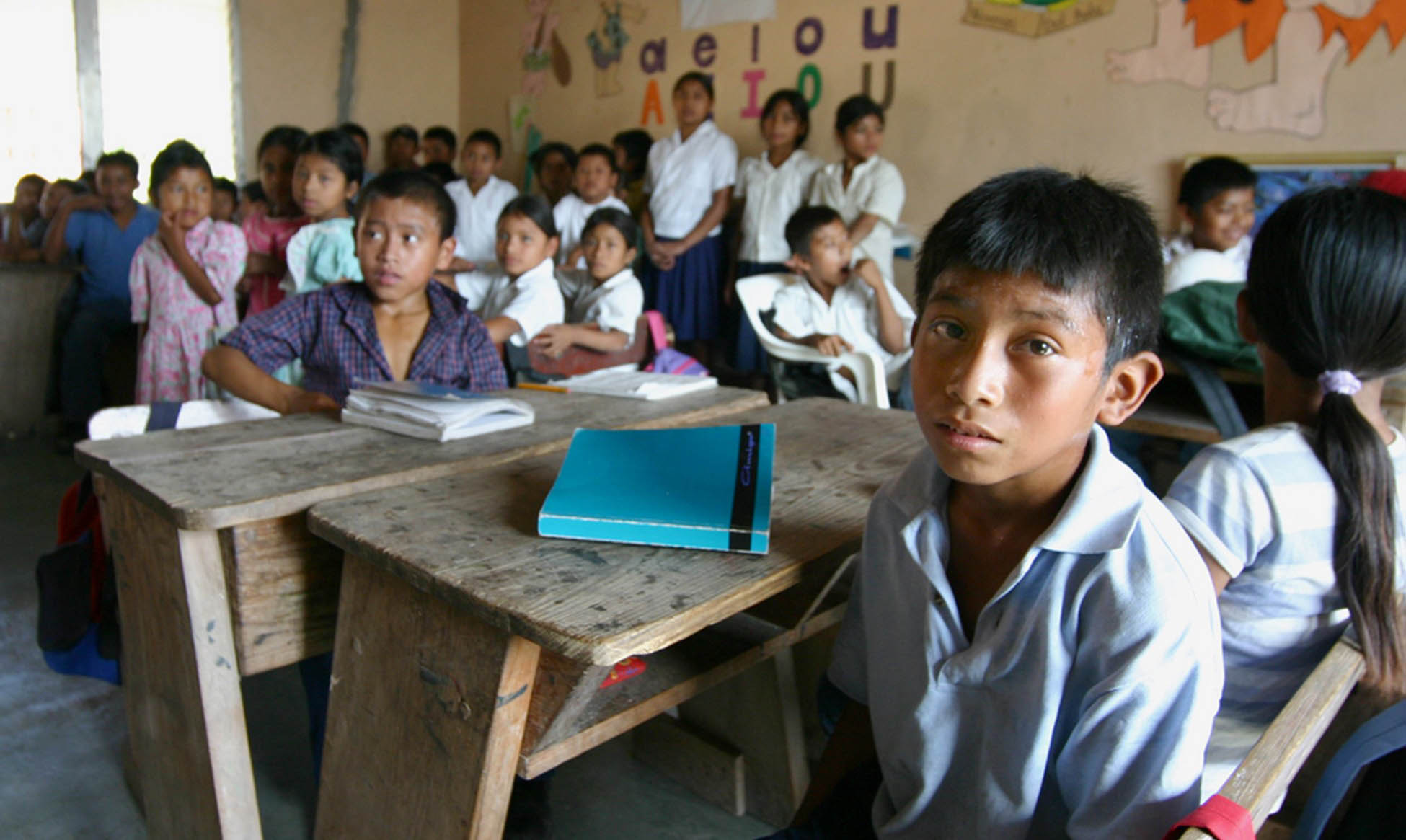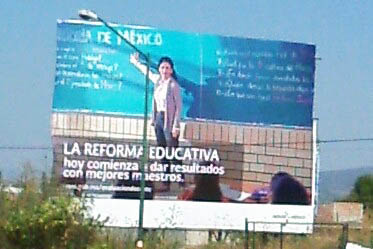|
|
|
|
The weekly newsletter of the México Solidarity Project |
|
|
|
November 3, 2021/ This week's issue/ Meizhu Lui, for the editorial team |
|
A Revolutionary Idea: Teaching to the Child! |
|
As the only Asian kid in my grade school, I was looked upon as kind of a freak. I thought of myself as someone with a deficiency. Then, in junior high, my English teacher told me that the Chinese imagery in a story I had written made the piece unusually compelling. I didn’t realize I had used any Chinese imagery! But her remark produced an epiphany in me: I didn’t have any sort of deficiency. I had extra resources to draw from. |
|
|
Eligio Valdés now serves as the principal of a primary school in Michoacán, where one-size-fits-all mandates for what and how to teach aren’t meeting the needs of indigenous students. Valdés, an activist who formerly led the Michoacán section of the independent CNTE teachers union, is working to change that. And so are his fellow CNTE activists, who currently earn only a quarter of what US teachers make — and sometimes not even that. They’ve been striking and blockading railroads because Michoacán’s Morena governor hasn’t been paying out their paychecks as promised. |
|
|
Teachers in México have been in the vanguard of social change for a century. Why have they played such a militant role?
Eligio Valdés: Teachers and priests have been the main educated people in small towns across México. Teachers have always lived among the people, as part of the community. Through many phases of history they’ve been in a position to see what needs to change, and they have the ability to develop alternatives to the existing system.
Today, in Michoacán, in spite of great difficulties and limited resources, we’ve been able to construct and put into practice a “Democratic Program for Education and Culture” for our state that challenges the official program of the government.
The 1.4-million-member SNTE teachers union — Sindicato Nacional de Trabajadores de la Educación — ranks nationwide as México’s largest union. But in Michoacán the independent Coordinator Nacional de Trabajores de Educación — the CNTE — has become the primary teacher voice. How does the CNTE operate?
In the CNTE, a broad collective of democratic teachers, all members make decisions and act together to solve the problems we face, a process completely different from the authoritarian charro union structure, where the leader alone makes the decisions, behind closed doors with government officials, all acting with complete impunity. This opens the door to corruption.
Teacher protests in México have inspired US labor activists. Do you see the independent teachers movement as part of the union movement or more of a social movement?
The CNTE has gone through different stages. At first, it functioned like a conventional union. At its first congress, in 1989, CNTE’s demands focused on raising salaries and building a more democratic union. In the next period, we became more involved in social issues like the privatization of energy, social security, and, acting together with our communities, protesting police attacks. |
|
Does everyone in México have access to an education?
Class remains the biggest barrier. If you want to continue your studies after high school, it can get expensive: books, transportation, even often having to move and find new housing. Marginalized communities, indigenous and otherwise, have the worst situation. |
|
Indigenous teachers seem to have played an oversized role in the protests calling for reforms. What have these protests accomplished?
Teachers in the sector Indígena en Michoacán have displayed a high degree of discipline, seriousness, and determination in the daily struggles. In Michoacán, they’ve designed a model curriculum for indigenous education for the four original peoples: Mazhua, Otomi, Nahua, and Purépecha. They’ve rooted the curriculum in the communal philosophy of those cultures. In all, they have 3,330 indigenous teachers in 713 bilingual schools, teaching in Spanish and in each of those four languages. In all of México, only about 5 percent of teachers rate as bilingual in an indigenous language.
Do teachers support AMLO’s anti-neoliberal reforms in education?
During the presidency of Peña Nieto, who preceded AMLO, teachers in the CNTE fought heroically against the reforms that made rote testing on subjects determined by the neoliberal state the basis for students to pass and for teachers to keep their jobs. Over the Nieto years, teachers paid a high price for their resistance and disobedience: in lives lost, in disappearances and incarcerations, in physical and administrative repression. The government succeeded in containing our movement, but they could not stamp it out.
When AMLO was running for president, he promised the CNTE that he wouldn’t leave in place even one comma from the neoliberal education reform. But, over the past three years of his leadership, that promise has not been kept. His administration’s education reform remains pro-corporate, still in essence the reform of Peña Nieto. And so we continue to fight for the children, for teachers, and for the nation. |
|
|
Mexican Educational Reform and Political Wrangling |
|
Mexican President Enrique Peña Nieto’s 2013 education reform essentially put the blame for the failings of Mexican education on teachers and subjected all educational personnel to tests that could end their careers if not passed. Author C.E. Flores, in this 2015 article, describes her first-hand experience with the educational system that the AMLO government has inherited. |
|
|
The last Friday of every month during the school year…is the dreaded CTE (Consejo Technico Educativo) meeting for teachers…a direct result of recent educational reforms passed into law by the esteemed Mexican President Peña Nieto. In theory, additional teacher training is a good idea. After all, the Mexican educational system definitely has room for improvement. But…
The CTE forum is based on a teacher training program used in Chile, modified to suit the Mexican government’s agenda. Instead of open and frank discussion and problem-solving, the content of the CTE meetings is carefully orchestrated by the Ministry of Public Education. Each meeting is to focus on a reglamento (statute) and there is no room for individual school differences based on the assumption that the teachers, students, and schools in Oaxaca and those in Mexico D.F. are equal in every way. Everybody must be on the same page as the program progresses…
One teacher described the situation in this allegory paraphrased below:
The government has seen that our students are in an educational “bus” that is in poor condition…The shocks are gone, the brakes don’t work, the steering wheel is loose, the floor is rusted through and so on. The government sees that our children take this bus over a rough road, hardly even a road, full of dangerous curves, holes, steep cliffs and so on (Mexican society). So the government’s solution to this is to take the driver of the bus (the teacher), give him a new suit, a fancy cap, train him to fly planes even. Then, after all that specialized training, put him back in the same bus that runs over the same road.
After his 2018 election, AMLO scrapped Peña Nieto’s education reform and repealed the so-called “merit-based” structuring of salaries and promotions. AMLO also extended access to free higher education among the country’s most impoverished students. But critics charge that the AMLO government has done little for the critical lower grades. Average Mexican teacher salaries still hover at only 25 percent of the average US teacher salary. |
|
|
Recent news reports and commentaries, from progressive and mainstream media,
Michoacán teachers maintain their stand: no classes, rail blockades continue, México News Daily. The Mexican government has failed to pay some 28,000 teachers their salaries due.
Nick Corbishley, México’s AMLO Blasts IMF for Causing Global Crisis, After Fund Takes Aim At His Energy Policy, Naked Capitalism. For decades IMF policies have been extremely damaging to economies around the world, particularly in emerging markets, while being extremely beneficial for large owners of footloose capital.
María del Pilar Martínez, A partir del primer minuto del 3 de noviembre inicia segunda etapa de la reforma laboral en 13 estados, El Economista. Sostuvo Germán de la Garza de Vecchi, socio Líder de Servicios Laborales en Deloitte México: “Este es uno de los cambios más relevantes en la implementación de la reforma en materia de libertad sindical.”
Manuel Perez-Rocha, Latin America Should Withdraw from the World Bank’s Harsh Trade Court, Foreign Policy in Focus. A secretive World Bank tribunal lets multinational corporations sue governments over basic regulations. Mexico should lead a Latin American exodus.
Jared Laureles, Contrato colectivo es del Sindicato Minero en Sombrerete, ratifican, La Jornada. Una sentencia de la Suprema Corte de Justicia de la Nación garantiza el derecho de huelga como se encuentra estipulado en el artículo 902 de la Ley Federal del Trabajo.
David Blackmon, México Moves To Re-Nationalize Energy Markets – A Return To 1938? Forbes. The US corporate press is lamenting that recent moves by México’s government targeting the country’s energy industry have led to increasing concerns that AMLO intends to ultimately re-nationalize the nation’s entire energy sector, a move that happened once before, in 1938.
Adyr Corral y AP, Gobierno de EU busca nuevo intento de poner fin a la política de “Permanecer en México,” Milenio. El secretario de Seguridad Nacional, Alejandro Mayorkas, aseguró que pese a que la política ayudó a reducir la migración en la fronteras con México pero con "costos humanos sustanciales e injustificables" para los solicitantes de asilo. |
|
|
The Mexico Solidarity Project brings together activists from various socialist and left organizations and individuals committed to worker and global justice who see the 2018 election of Andrés Manuel López Obrador as president of México as a watershed moment. AMLO and his progressive Morena party aim to end generations of corruption, impoverishment, and subservience to US interests. Our Project supports not just Morena, but all Mexicans struggling for basic rights, and opposes US efforts to undermine organizing and México’s national sovereignty.
Editorial committee: Meizhu Lui, Bruce Hobson, Bill Gallegos, Sam Pizzigati, Courtney Childs. We welcome your feedback. Interested in getting involved? Drop us an email! |
|
|
|
Web page and application support for the México Solidarity Project from NOVA Web Development, a democratically run, worker-owned and operated cooperative focused on developing free software tools for progressive organizations. |








